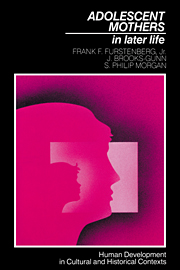Book contents
- Frontmatter
- Contents
- List of tables and figures
- Preface
- 1 Reassessing adolescent parenthood
- 2 Experience in adulthood
- 3 Pathways to success in adulthood
- 4 The children's experience
- 5 The intersecting life courses of adolescent mothers and their children
- 6 The life course of adolescent mothers: implications for public policy
- Appendixes
- Bibliography
- Index
6 - The life course of adolescent mothers: implications for public policy
Published online by Cambridge University Press: 04 August 2010
- Frontmatter
- Contents
- List of tables and figures
- Preface
- 1 Reassessing adolescent parenthood
- 2 Experience in adulthood
- 3 Pathways to success in adulthood
- 4 The children's experience
- 5 The intersecting life courses of adolescent mothers and their children
- 6 The life course of adolescent mothers: implications for public policy
- Appendixes
- Bibliography
- Index
Summary
The 17-year follow-up of the Baltimore adolescent mothers and their children is, to our knowledge, the only investigation to date that has traced the life course of adolescent parents from first pregnancy to later adulthood, looking at both childbearers and their offspring. We have examined the long-term educational, familial, and economic careers of nearly 300 teenage mothers who were originally contacted at the time of their first pregnancy. The analysis provides a detailed account of changes in the life course of teenage mothers over a period of nearly two decades, identifying adaptations to early childbearing that predicted eventual success or failure. We then linked these maternal adaptations to the current wellbeing of the children.
Some of our results are of particular relevance to policymakers who must make difficult choices about when and how to intervene both in preventing the occurrence of adolescent childbearing and in lessening its costs. After reviewing what was learned about the adjustment of adolescent mothers and their children in later life, the question of how to enhance the efficacy of current intervention strategies aimed at reducing the adverse effects of early childbearing will be addressed.
The Baltimore study
The history of the Baltimore study and features of the research design were presented in Chapter 1. The sample is a predominantly black one residing in a large middle Atlantic city, and therefore the findings extend only to urban blacks.
- Type
- Chapter
- Information
- Adolescent Mothers in Later Life , pp. 130 - 154Publisher: Cambridge University PressPrint publication year: 1987



